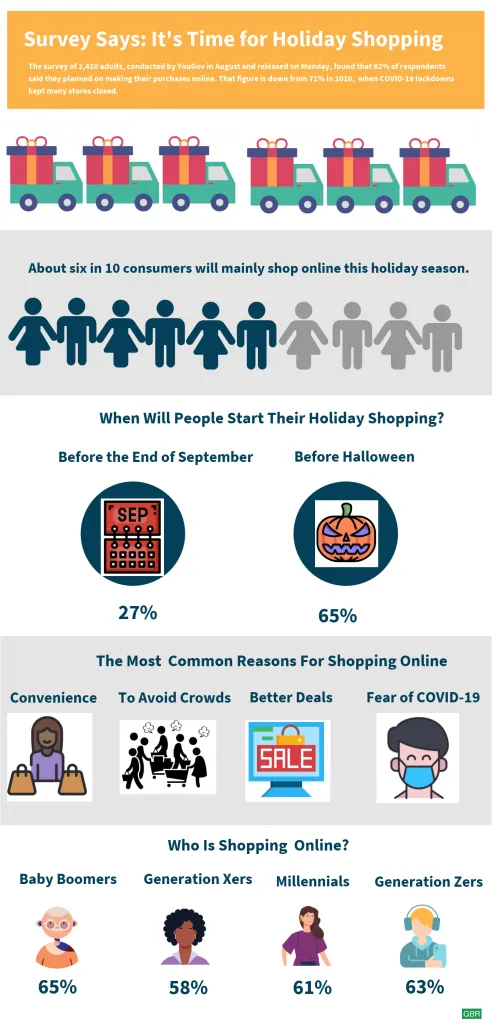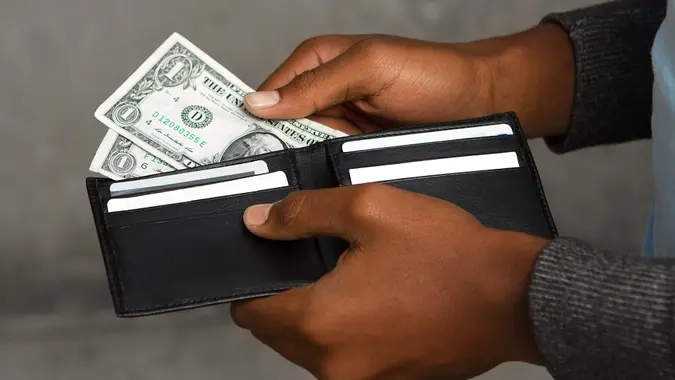Most Holiday Shoppers Will Buy Online — And Start Early

Commitment to Our Readers
GOBankingRates' editorial team is committed to bringing you unbiased reviews and information. We use data-driven methodologies to evaluate financial products and services - our reviews and ratings are not influenced by advertisers. You can read more about our editorial guidelines and our products and services review methodology.

20 Years
Helping You Live Richer

Reviewed
by Experts

Trusted by
Millions of Readers
About six in 10 consumers will mainly shop online this holiday season, according to a new survey from Creditcards.com, and more than half plan to start before Halloween to avoid potential supply-chain disruptions.
See: Supply Chain Issues Make Now an Ideal Time to Start Your 2021 Holiday Shopping
Find: Hurricane Ida Repairs Expected to Make Supply Chain Issues Worse
The survey of 2,410 adults, conducted by YouGov in August and released on Monday, found that 62% of respondents said they planned on making their purchases online. That figure is down from 71% in 2020, when COVID-19 lockdowns kept many stores closed, but well up from 51% in 2019.
The most common reasons for shopping online include (in order of popularity) convenience, avoiding lines and crowds, getting better deals and prices and fear of COVID-19. For once, generational differences were minimal. About 65% of baby boomers said they will be shopping online, a rate that is pretty close to Generation Zers (63%), millennials (61%) and Generation Xers (58%).
More than half of shoppers (51%) plan to start their holiday shopping before Halloween, and more than one-quarter (27%) said they’d start before the end of September. Many are motivated by the prospect of supply-chain issues either preventing them from getting the items they want or preventing those items from arriving on time.
See: Consumer Confidence Declines to 6-Month Low Amid Delta Variant and Inflation Concerns
Find: Where to Get Unique Holiday Gifts Without Leaving Your House
Starting early is probably a good idea this year. As previously reported on GOBankingRates, waiting until Black Friday to start your holiday shopping this year could be a costly mistake because of ongoing supply-chain problems tied to the COVID-19 pandemic and its variants. This has been a particularly big problem in countries such as Vietnam, Malaysia and Indonesia, which have suffered a slowdown in production due to the pandemic.
Companies with manufacturing operations in those countries, including Nike and Gap, are scrambling to find alternative solutions, Forbes reported in late August.
“Shopping in December is going to be really risky this year, not just because of delays in getting your stuff, but because of retailers’ ability to restock throughout December,” Kristen McGrath, shopping expert at RetailMeNot, told Forbes. “Stuff that sells out early might not come back in stock in time for you to buy it for the holidays.”
See: 15 Credit Card Hacks for Big Holiday SavingsFind: Walmart Is Hiring 20,000 Workers to Battle Holiday Supply Chain Issues
One company taking a proactive approach is Walmart, which recently announced plans to hire 20,000 new workers to help meet holiday demand and overcome supply chain challenges.
Those challenges aside, some retail experts expect a busy holiday shopping season.
“Most Americans have boosted their savings and paid down debt over the past year and a half, and there’s still a lot of pent-up demand and a desire for a happy, traditional holiday season,” said Ted Rossman, senior industry analyst at CreditCards.com.
See: Key Inflation Gauge Sees Highest Jump Since 1990s, Rising 3.6%Find: The Extra Holiday Travel Costs You’ll Need to Budget For This Year
Rossman advises starting your holiday shopping early so you’ll have more time to compare prices, spread out the cost of your purchases and account for shipping delays or other supply chain disruptions.
Other key findings from the CreditCard.com survey include the following:
- The largest percentage of shoppers (42%) plan to buy most of their gifts with a debit card. That compares to 38% who plan to use credit cards, 15% who plan to use cash and 5% who plan to use “buy now pay later” services such as Affirm, Afterpay and Klarna. Using debit cards tends to be less secure than using credit cards in terms of fraud protection, but debit cards also lower the risk of falling into debt and getting stuck with high interest rates.
- Shoppers in the highest income bracket ($80,000-plus per year) plan to use credit cards the most (50%), followed by 41% of middle-income households ($40,000-$79,999) and 25% of lower-income households (less than $40,000). Nearly half of lower-income shoppers prefer using debit cards, compared with 42% of middle-income and 35% of higher-income shoppers.
- The shift to online shopping has also increased demand for prepaid cards because they give underserved customers access to online merchants.
 More From GOBankingRates
More From GOBankingRates
- 101 Easy Ways To Save Money Daily
- Can You Afford Education in America at These Prices?
- 5 Bulk Food Items You Need To Be Buying at Costco This Fall
- 10 Reasons You Should Claim Social Security Early
 Written by
Written by  Edited by
Edited by 

























